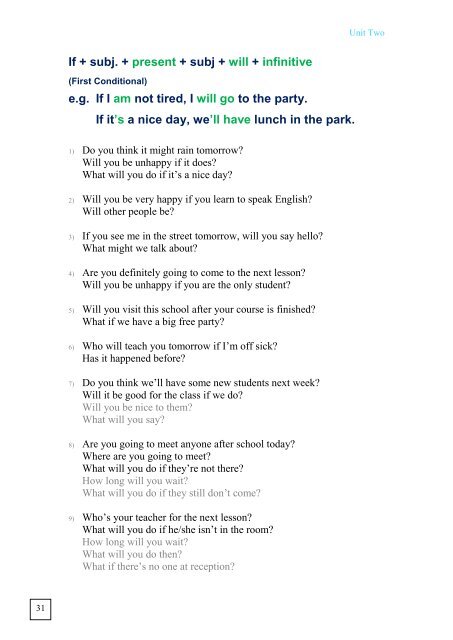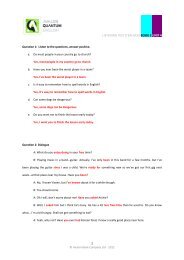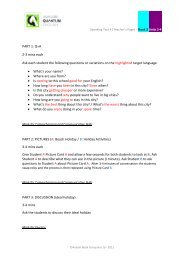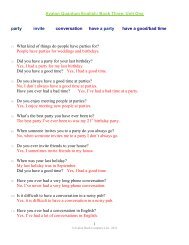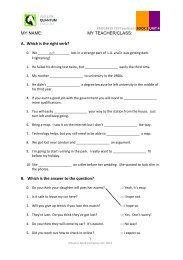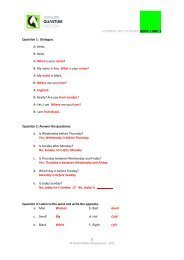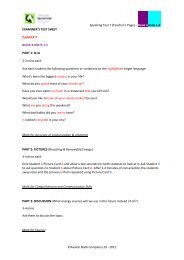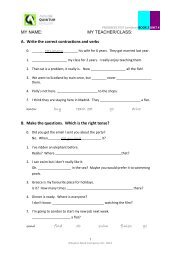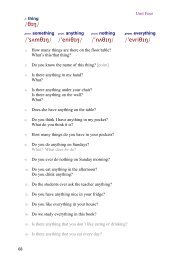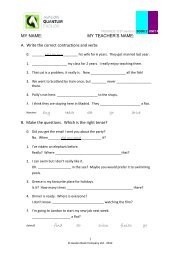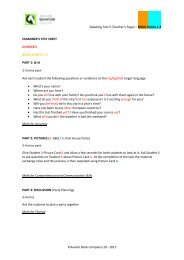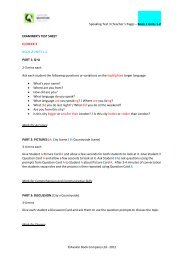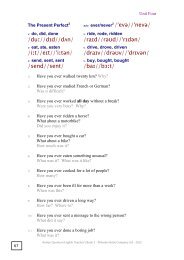You also want an ePaper? Increase the reach of your titles
YUMPU automatically turns print PDFs into web optimized ePapers that Google loves.
Unit TwoIf + subj. + present + subj + will + infinitive(First Conditional)e.g. If I am not tired, I will go to the party.If it’s a nice day, we’ll have lunch in the park.1) Do you think it might rain tomorrow?Will you be unhappy if it does?What will you do if it’s a nice day?2) Will you be very happy if you learn to speak <strong>English</strong>?Will other people be?3) If you see me in the street tomorrow, will you say hello?What might we talk about?4) Are you definitely going to come to the next lesson?Will you be unhappy if you are the only student?5) Will you visit this school after your course is finished?What if we have a big free party?6) Who will teach you tomorrow if I’m off sick?Has it happened before?7) Do you think we’ll have some new students next week?Will it be good for the class if we do?Will you be nice to them?What will you say?8) Are you going to meet anyone after school today?Where are you going to meet?What will you do if they’re not there?How long will you wait?What will you do if they still don’t come?9) Who’s your teacher for the next lesson?What will you do if he/she isn’t in the room?How long will you wait?What will you do then?What if there’s no one at reception?<strong>31</strong>
Unit TwoNEW WORK:See the Grammar Section.Don’t start with the structure. Start with the context. Show the students that weare talking about things that might happen and might not.Make the examples as real as possible. The weather is always a good one in theUK. Or:We might go to the pub tonight. I’m not sure. If we go to the pub, I will call you.Use CQs belowWhen you have 2 or 3 examples on the board, elicit the structure, emphasising theuse of the present after if – which is the most likely source of error.Show that the 2 clauses of the sentence can change order.The last thing is to label this structure as the First Conditional.CHECK QUESTIONS(Using example above)Will we go to the pub? maybe Will I call you? maybeAm I talking about the future? What tense is this [go]? What tense isthis [will call] ?REVISION:To begin with they may have to answer the same questions quite a few times, justso that this new sentence structure beds in.Once the questions in the book are no longer a challenge, you can start to varythem. Try to get them making their own examples with this structure.Pay some attention to sentence stress and intonation, too. It may seem like justthe icing on the cake, but it will really help the student to communicate moreeffectively with native speakers, who use those signals to anticipate and interpret.We can use other future forms apart from will, and the most common of these ismight. It should be easy for students to use them both according to the level ofcertainty. Other present forms are possible too, including the perfect andcontinuous, but it is not easy to teach them at this level.Don’t get too attached to the idea of 0/1 st /2 nd /3 rd /Mixed conditionals as separatethings. In practice, mixed forms are often necessary.<strong>31</strong>


